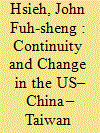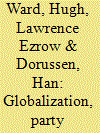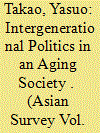| Srl | Item |
| 1 |
ID:
173979


|
|
|
|
|
| Summary/Abstract |
The relations between China and Taiwan (cross-Strait relations) have been a thorny issue for all parties concerned. These relations are one of the flashpoints in the world, which may trigger a serious military conflict. They involve not only China and Taiwan but also the United States. The purpose of this paper is to account for the trajectory of this triangular relationship with the help of opinion surveys in Taiwan. It is shown that when the Kuomintang (KMT) gains the governing power in Taiwan, Taiwan is the median voter in the cross-Strait relations game at the international level while as a non-traditional KMT or the Democratic Progressive Party is in power, it is the US that turns out to be the median voter.
|
|
|
|
|
|
|
|
|
|
|
|
|
|
|
|
| 2 |
ID:
106335


|
|
|
|
|
| Publication |
2011.
|
| Summary/Abstract |
The authors argue that the effects of economic globalization on social democratic parties in Western Europe are conditional on the position of the median voter. If the median is far enough to the right, such parties will adopt business-friendly policies because they are required to win office. Only when the median is relatively far to the left will globalization constrain social democratic parties, forcing them to adopt policies further to the right in order to retain credibility. It is on this basis the authors argue that empirical studies are misspecified unless they include an interaction between measures of globalization and the position of the median. In addition to presenting formal theoretical arguments, the article reports empirical findings from fifteen countries in the period from 1973 to 2002 that support the conclusion that the effects of globalization are indeed contingent on the median. The authors find that the effects of globalization are significant for social democratic parties only in circumstances in which the median is relatively far to the left.
|
|
|
|
|
|
|
|
|
|
|
|
|
|
|
|
| 3 |
ID:
186408


|
|
|
|
|
| Summary/Abstract |
Japan’s population is aging faster than any other nation’s, producing many more older voters, and raising an important question related to intergenerational equity. Do older voters prioritize their short-term self-interest at the expense of other generations? I find that the older voters in Japan are surprisingly less self-interested—even less than similarly aged voters in other advanced economies—in maximizing their benefits as service consumers to the detriment of younger voters. This behavior of older voters in Japan is an enigma. To stimulate dialogue about an equitable and sustainable welfare system, I consider a set of structural and institutional factors that may, individually or collectively, help explain the apparently less self-interested preferences of older voters in Japan.
|
|
|
|
|
|
|
|
|
|
|
|
|
|
|
|